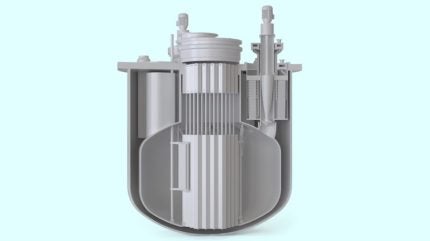
France-headquartered nuclear start-up newcleo has started the land acquisition process for its demonstration LFR-AS-30 small modular reactor design in Indre-et-Loire in the Chinon Vienne et Loire community of municipalities in western France.
The company has “formally initiated constructive discussions and procedures” with the Chinon Vienne et Loire community of municipalities on the siting of the reactor. “Preliminary meetings with local officials, the Chinon Vienne et Loire community of municipalities, and state authorities have allowed newcleo to present its project while reaffirming its commitment to maintaining a constructive dialogue with all local stakeholders,” it said.
According to newcleo’s delivery roadmap, the first non-nuclear pre-cursor prototype of its reactor is expected to be ready by 2026 in Italy, the first reactor operational in France by the end of 2031, while the final investment decision for the first commercial power plant is expected around 2029. Newcleo said its 30 MWe lead-cooled fast reactor (LFR) will “serve as an industrial demonstrator, a showcase for newcleo’s technology, and contribute to the development of the nuclear sector in France”.
However, newcleo has provided very little technical information about its LFR design. The newcleo website includes a mock-up of the reactor. The company claims to “capitalise on 30 years of R&D activity in metal-cooled fast reactors and liquid-lead cooling systems. Newcleo says its reactor design “has been optimised over the last 20 years leading to the concept of an ultra-compact and transportable 200 MWe module with improvements in energy density compared to other technologies”.
Currently, however, the only operating liquid metal-cooled fast reactors are in Russia, using sodium as the coolant. Russia is also constructing the world’s first ever lead-cooled SMR (Brest-OD-300) in Seversk as part of a facility to demonstrate an on-site closed fuel cycle. This reactor is based on decades of complex research and development supported by the entire Russian nuclear industry. It is due to begin operation in 2029. By contrast, newcleo’s technology remains in the very early conceptual design stage.
Newcleo has been very active in fundraising and signing partnership and collaboration agreements. Its business now counts over 90 partnerships, and more than 1,000 employees based in 19 locations across France, Italy, the UK, Switzerland, and Slovakia, including three manufacturing facilities. Since 2021 the company has raised a total of over €537m ($567m) from institutional and individual investors and has seen an increasing number of European players joining newcleo’s growing funding base – which to date counts over 700 shareholders.
As to the land acquisition, newcleo says it approach follows the standard process for large-scale projects in France and will be accompanied by a series of preliminary studies required for administrative authorisations and subsequent decisions. “The entire process is conducted in full compliance with the highest applicable regulations and standards, in close collaboration with the relevant authorities.”
The company said it will soon refer the matter to the National Commission for Public Debate, in accordance with the Environmental Code. Its project will then be presented during the upcoming public debate, providing a clear overview of its ambitions and commitments. The debate allows interested parties to participate in shaping major policies or projects with significant socio-economic or environmental impact, ensuring transparent and inclusive decision-making from the outset.
Last month, Newcleo signed framework agreements with Slovakian companies JAVYS and VUJE with the aim of building up to four of its 200 MWe LFRs at the Bohunice site.
With a €50m group turnover in 2024, newcleo says it “is supported through the targeted acquisition of key companies with strong capabilities in nuclear engineering, manufacturing, and waste management”.






